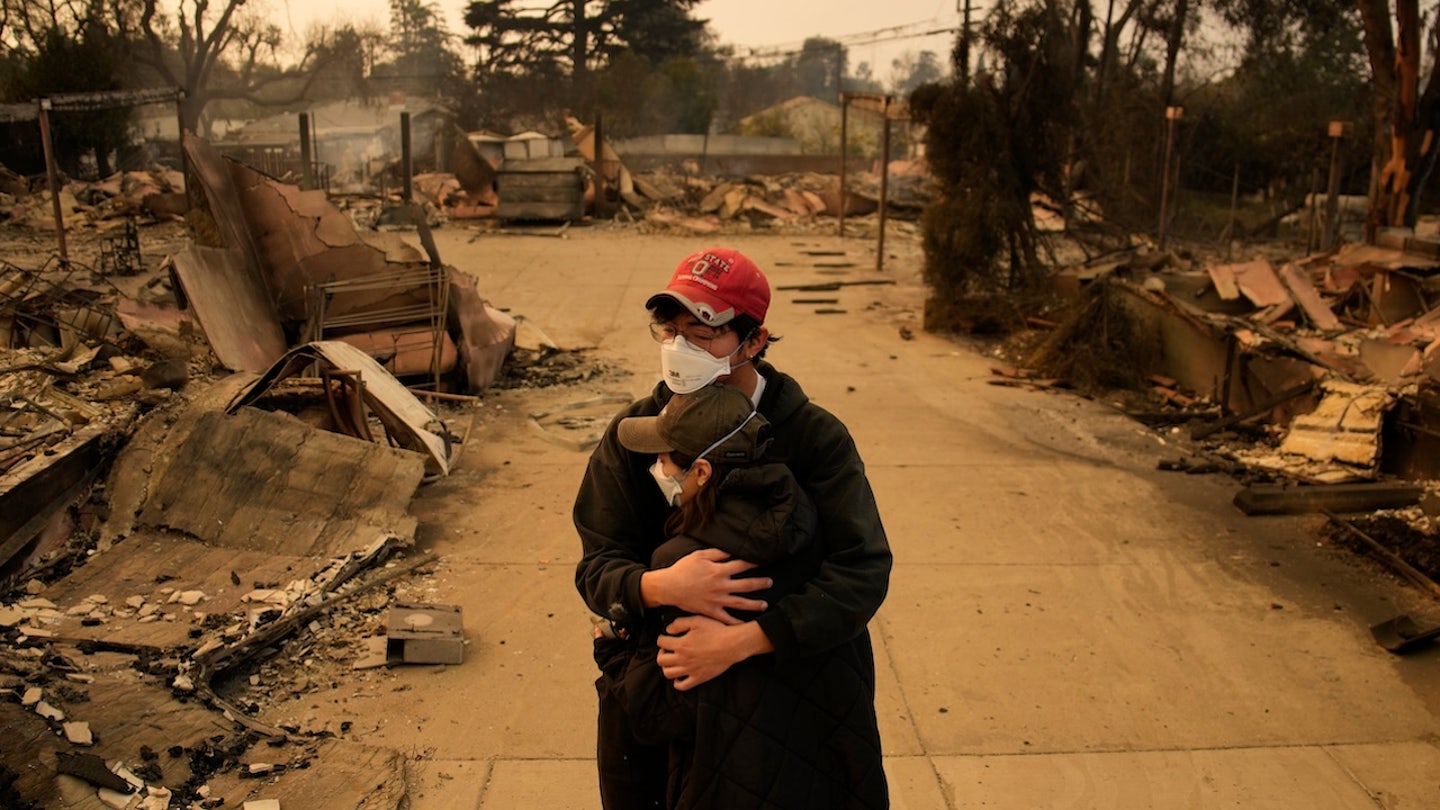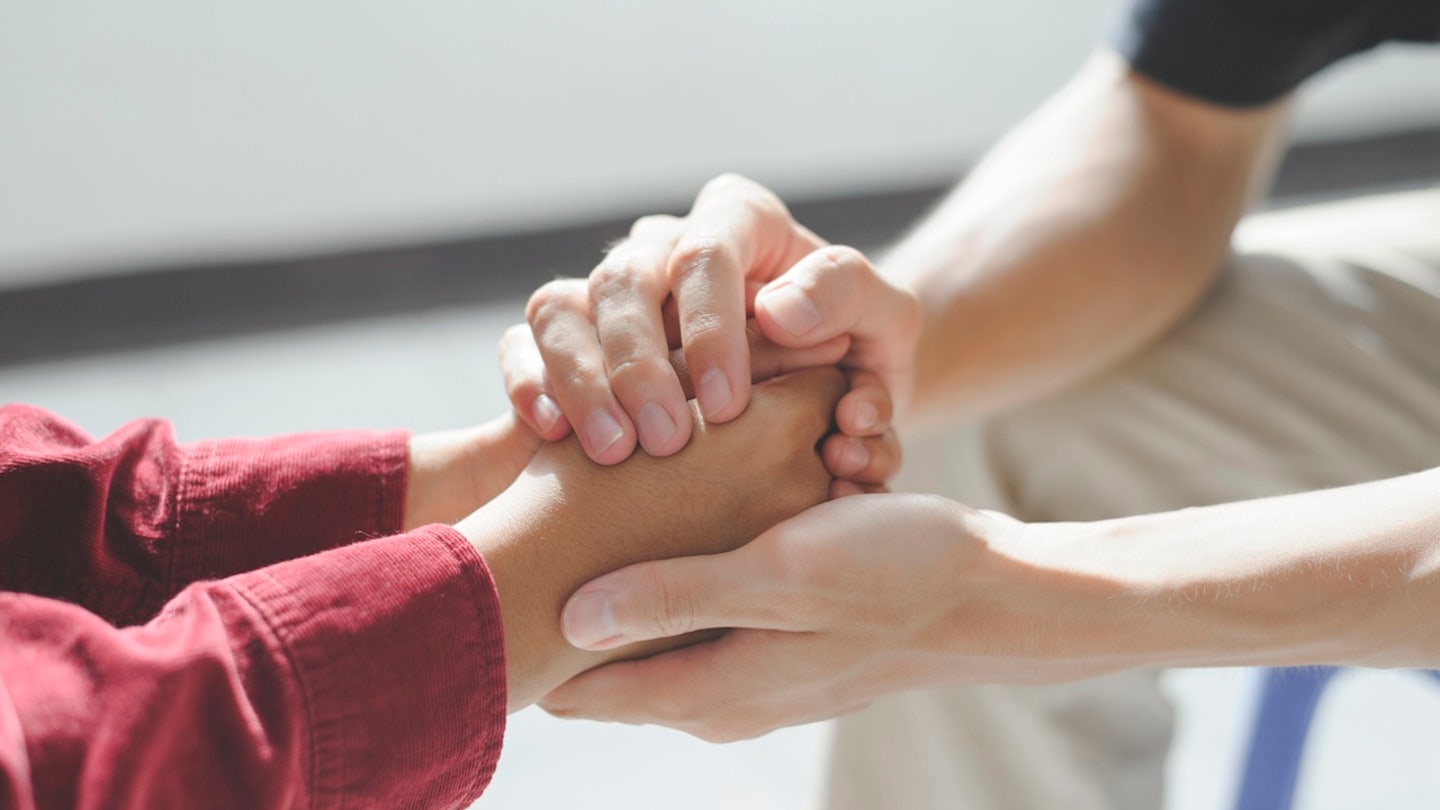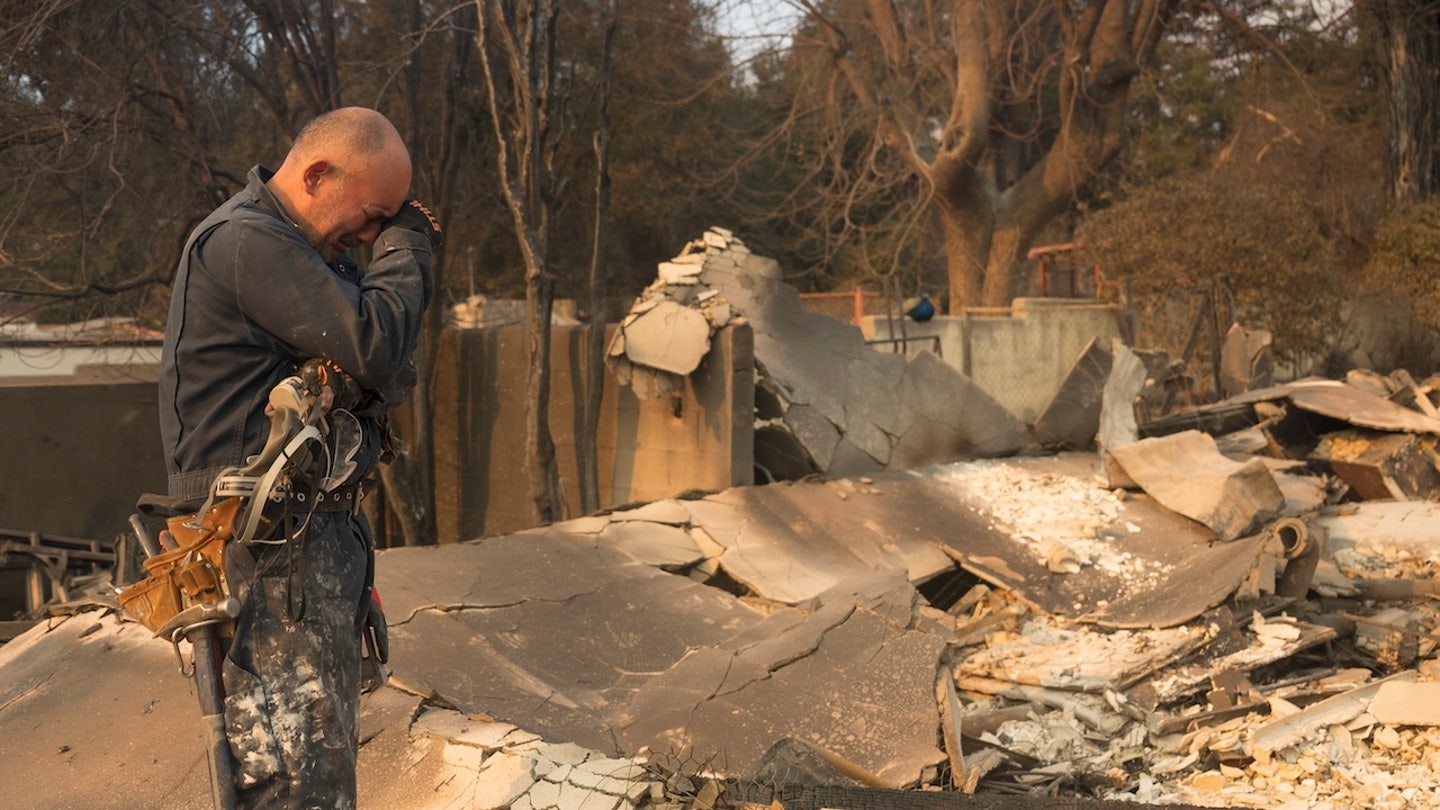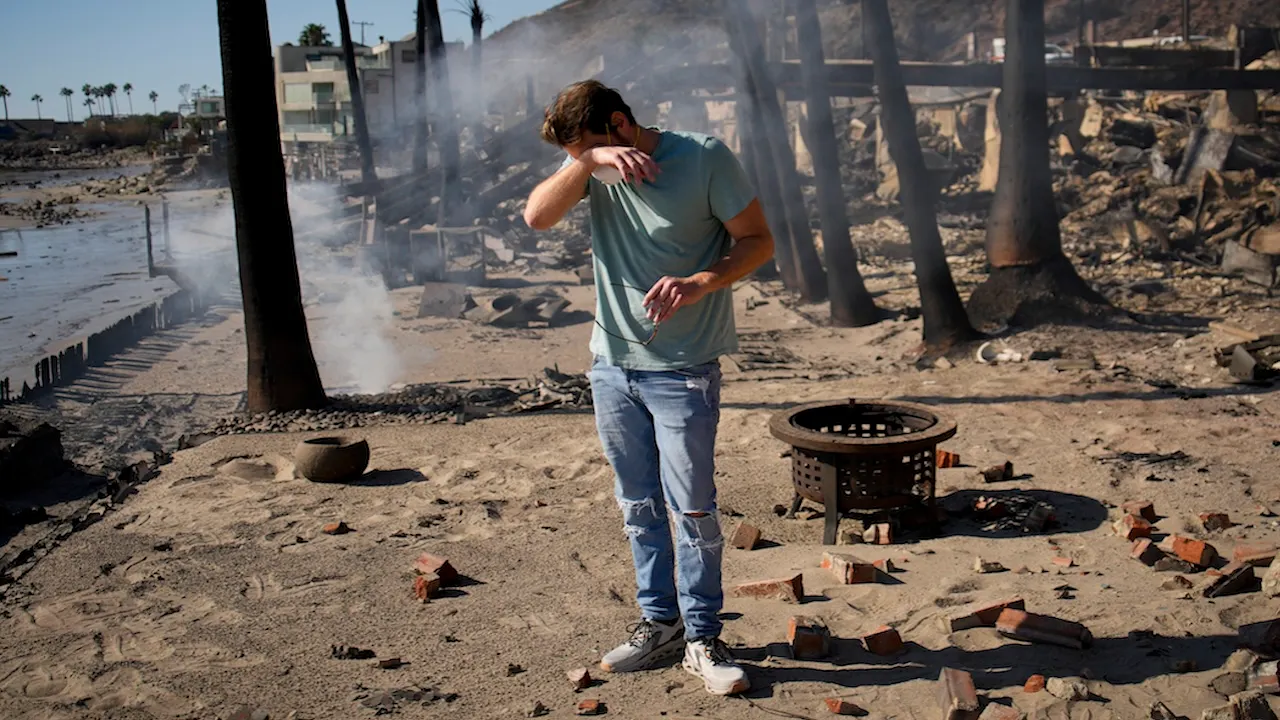As Los Angeles battles the worst wildfires in the city’s history, thousands of people have been displaced or have seen their homes burn to the ground.
Around 130,000 people were ordered to evacuate and some 10,000 structures were destroyed, according to the Associated Press. At least 10 people have died as a result of the blazes.
The devastation of the fires has undoubtedly taken a grave toll on the psyches of those affected, experts agree.
STEVE GUTTENBERG CALLS LA WILDFIRES ‘GREAT EQUALIZER,’ URGES PEOPLE TO LEAN ON ONE ANOTHER
Fox News Digital spoke with celebrities and mental health experts, who offered the following guidance for the people impacted.
Recognize your feelings
For those who have experienced a loss from the fires, common reactions include shock, disbelief and confusion, according to David Kessler, a grief counselor in Los Angeles and founder of Grief.com.
“I call it grief brain,” he told Fox News Digital.
Luke Dexter reacts as he sifts through the remains of his father’s fire-ravaged beachfront property in the aftermath of the Palisades Fire on Jan. 10, 2025 in Malibu, Calif. (AP Photo/John Locher) (AP Newsroom)
“Your mind is trying to comprehend what happened, and it’s a hard thing for it to do, because this is unimaginable that your house, your safety, is suddenly gone.”
Not all grief is related to death, Kessler noted, as there are many different types of losses.
“I always say grief is a change you didn’t want — and certainly a fire is a change we didn’t want,” he added.
WHAT IS PTSD? SYMPTOMS THAT CAN EMERGE AFTER EXPERIENCING A TRAUMATIC EVENT
It’s important to “self-validate” the reality of the loss, he said.
“People might give you toxic positivity of, ‘well, at least no one died,’” he said. And while that’s true, the reality is you still have lost your home. Don’t let anyone minimize that.”
“The loss of a home is devastating and it can take years to recover.”
“I think we’re going to deal with a lot of depression after this, a lot of sadness.”
Actor Steve Guttenberg, who lives in Pacific Palisades, California, where fires erupted on Tuesday, shared how the disaster has impacted his own mental health.
“I’ve seen so much tragedy the last three or four days that I’ve got to be careful to … keep a hold of my mind,” he said in an interview with Fox News Digital.
“And I think that we’re going to deal with a lot of depression after this, a lot of sadness. And it’s going to be really tough because this is like nothing you’ve ever seen.”

Actor Steve Guttenberg, who lives in Pacific Palisades, California, where fires erupted on Tuesday, shared how the disaster has impacted his own mental health. (AGUSTIN PAULLIER/AFP via Getty Images; Fox News)
Gutenberg noted that while it’s “very normal” to be down, he is trying not to let himself “go down that hole.”
“But I’m pretty sad about this,” he added.
HOW TO COPE WITH ‘COLLECTIVE GRIEF’ WHEN MASS TRAGEDY STRIKES
Jonathan Alpert, a psychotherapist in Manhattan and Washington, D.C., noted that the grief following the Los Angeles fires is “profound.”
“It’s not just about the physical loss of homes or belongings — it’s also about the sense of safety and normalcy that has been lost,” he told Fox News Digital.
“It’s important for people to feel emotions and not ignore them. This is a normal reaction to such overwhelming loss and tragedy.”
Reach out for support
Guttenberg emphasized the importance of maintaining connections with others and drawing support from the community during a disaster of this magnitude.
“We’re social animals — we need people,” he said. “So I’m reaching out to my friends. There’s no way to meet right now because it’s so dangerous — so the best thing you cn do … is call and reach out and maybe you can drive somewhere.”

Experts agreed that it’s essential to avoid isolating yourself after a loss. “We need to be taken care of. We need other people around us.” (AP Newsroom)
Most of the people in town have evacuated, he pointed out. “There’s probably 10% of the population left here. Or less.”
Kessler reiterated that connection is critical after this type of trauma. “We need to be taken care of. We need other people around us. People equal safety,” he said.
“We need other people around us. People equal safety.”
Pastor Jesse Bradley of Grace Community Church outside Seattle, Washington, agreed that it’s essential to avoid isolating yourself after a loss.
CLICK HERE TO GET THE FOX NEWS APP
“We need God and we need each other. Community is vital,” he told Fox News Digital.
Family, friends and neighbors care about you. God sends His love through these people. Reject isolation. Don’t shut down and don’t shut people out.”
Take action
“In times of crisis such as this, regaining even small amounts of control can be grounding,” Alpert said.
He recommends creating a plan for what’s next, whether it’s finding temporary housing, accessing local resources or starting the process of rebuilding.
“Taking action — no matter how small — can help you move forward.”

Ben Treger hugs his wife Sarah Treger after finding his grandfather’s watches at the remains of their Pacific Palisades home on Thursday, Jan. 9, 2025. “If you do have survivor’s guilt, I always say the best thing is to take action,” one expert advised. (Juan Carlo/Imagn)
Kessler agreed, noting that people who are in the area but did not experience loss may feel a sense of relief mixed with guilt.
“If you do have survivor’s guilt, I always say the best thing is to take action,” he advised.
In the longer term, advocacy efforts can be a powerful tool in dealing with trauma, Alpert noted.
MIKE POSNER REVEALS HOW FAITH REDIRECTED HIS LIFE, OFFERS ADVICE ON SPENDING HOLIDAYS WITH FAMILY
“Working to improve fire prevention policies, supporting relief efforts or helping neighbors rebuild can provide a sense of purpose and empowerment during this difficult time,” he said.
Some people may be angry about the systems that failed to prevent the fires in the first place, Alpert acknowledged, and this anger can be a “powerful motivator.”
“Taking action — no matter how small — can help you move forward.”
“Use that energy to demand better, but don’t get stuck on the anger,” he advised.
“By holding leaders accountable for the policies — or lack thereof — that contributed to this devastation, and by asking the right questions and demanding answers, you might start to feel better.”
Seek professional help as needed
“The L.A. fires no doubt will not just leave physical scars, but deep emotional ones, too,” Alpert said.
“For many people, the fear, panic and helplessness experienced during the fires don’t just disappear — they linger, creating flashbacks, anxiety and difficulty functioning.”

“For many people, the fear, panic and helplessness experienced during the fires don’t just disappear — they linger, creating flashbacks, anxiety and difficulty functioning.” (iStock)
In many cases, this can lead to post-traumatic stress disorder (PTSD). Symptoms of this condition can include vivid memories of the fires, nightmares, hypervigilance or avoidance of anything that reminds someone of the event, Alpert said.
“It’s important to see this not as weakness, but rather, the mind’s and body’s way of trying to cope with extreme stress.”
“While the fires were devastating, they don’t diminish your strength or character.”
As you seek help, it’s also important to understand that PTSD doesn’t define you, he added.
“It’s a part of your experience, not your identity. While the fires were devastating, they didn’t diminish your strength or character.”
Lean on your faith
For those who have experienced traumatic grief, Kessler emphasized the importance of faith and spirituality.
CLICK HERE TO SIGN UP FOR OUR HEALTH NEWSLETTER
“They help ground us in a world full of fear,” he said. “And when we’ve lost everything, it can feel like our faith is the one thing we have to hold onto.”
During a time of crisis, Guttenberg said it’s important to “rely on anything that you believe in.”

Cesar Plaza becomes emotional while looking at his home destroyed by the Eaton Fire in Altadena, California, on Jan. 9, 2025. “It’s easy to be consumed with what you no longer have,” a pastor told Fox News Digital. (AP Photo/Nic Coury) (AP Newsroom)
“If you believe in your mom and dad, you rely on them, your brothers and sisters, your friends, your family. God, the universe.”
Above all, he added, “Just remember, you’re not alone. God is always with you. Jesus is always with you. You’ve got to hang on to that.”
Find ways to exercise gratitude
During times of hardship, it’s important to recognize the good things that are still in your life, Pastor Bradley said.
“It’s easy to be consumed with what you no longer have,” he told Fox News Digital.
For more Health articles, visit www.foxnews.com/health
“You need to be intentional to take inventory of the blessings in your life. For example, you might lose a home or business, but you still have family.
This mindset will help you keep a healthy perspective and protect gratitude, Bradley added.

